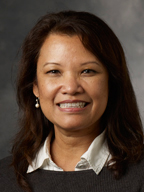
The Stanford CyberKnife Program Team
Neurosurgery
 Steven Chang, MD
Steven Chang, MD
Co-Medical Director, CyberKnife Radiosurgery Program
Professor of Neurosurgery
Dr. Steven Chang received his medical degree from Stanford University. He completed his neurosurgical training at Stanford with a focus on stereotactic radiosurgery, cerebrovascular disease, and brain and spinal tumors. He is recognized as an expert in CyberKnife Radiosurgery and surgical resection of brain tumors. Dr. Chang is a research interest in neurogenetics and protenomics.
 John Adler, MD
John Adler, MD
Emeritus Faculty, Neurosurgery
Dr. Adler was educated at and received his neurosurgical training at Harvard University. Part of this training included a year fellowship at the Karolinska Institute under the tutelage of Professor Lars Leksell, the father of radiosurgery. Upon joining the Stanford faculty, Dr Adler conceived of and led the effort to create the field of image-guided radiation, with the CyberKnife being its initial manifestation. Over 2 decades, Dr. Adler pioneered the use of such image-guided radiosurgery for treating a broad range of benign and malignant neurosurgical diseases. He was also instrumental in spear heading the utilization of the CyberKnife to treat cancers of the lung, pancreas and prostate both at Stanford and other leading medical schools. By virtue of such, Dr. Adler is universally recognized as being “the Father” of CyberKnife radiosurgery.
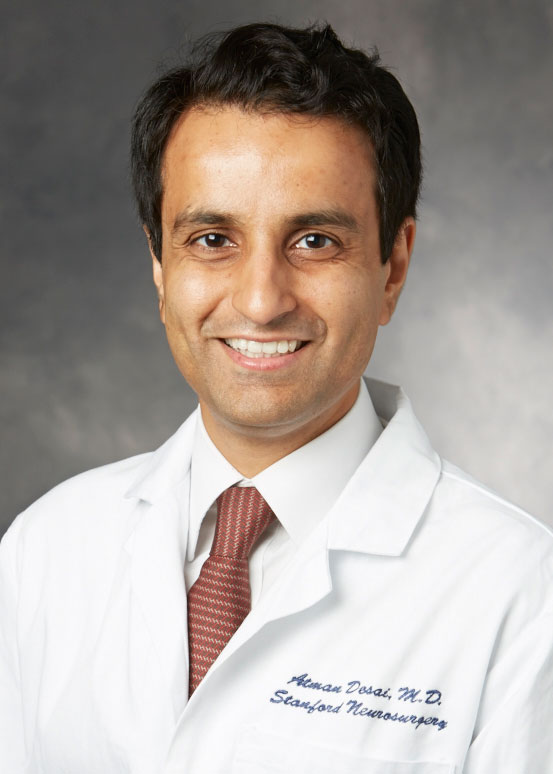 Atman Desai, MD, MA
Atman Desai, MD, MA
Director of Spinal Oncology, Clinical Assistant Professor, Neurosurgery
Dr. Desai received his Medical Degree from the University of Cambridge, and completed his residency in Neurosurgery at Dartmouth. He underwent fellowship training at Johns Hopkins hospital in Spinal Oncology and Complex Reconstructive Spinal Surgery. His research focuses on the use of big data to optimize outcomes in spinal surgery. His clinical practice focuses on the management of primary and metastatic spinal tumors, and minimally invasive spine surgery.
 Robert Dodd, MD, PhD
Robert Dodd, MD, PhD
Assistant Professor of Neurosurgery and of Radiology
Dr. Dodd received his medical degree from the Stanford University School of Medicine, where he also earned a PhD in Neurosciences from the Department of Neurobiology. His neurosurgery training also took place at Stanford, where he recently completed an endovascular fellowship. His research interests have been in cerebral blood vessel reactivity and stroke.
Dr. Dodd's clinical interests include endovascular and microsurgical treatment of intracranial aneurysms and arteriovenous malformations; percutaneous and surgical interventions for both extracranial and intracranial carotid artery occlusive disease; and minimally invasive neurosurgery though the use of neuroendoscopy and keyhole approaches.
 Michael S. B. Edwards, MD
Michael S. B. Edwards, MD
Professor of Neurosurgery and, by courtesy, of Pediatrics
Dr. Edwards’ clinical interests include the treatment of central nervous system tumors in children with neuro-oncology and radiation therapies, as well as applications of radiosurgery to pediatric neurosurgical disorders. His work includes Directorship of the Children’s Brain Tumor Center, Stanford Neuroscience Institute, Stanford University. Dr. Edwards’ interest in childhood vascular disorders culminated in the book, Cerebral Vascular Disease in Children and Adolescents, published by Williams & Wilkins in 1989.
Dr. Edwards has more than 150 published articles in referenced medical journals. He graduated with his medical degree from Tulane University, School of Medicine in New Orleans, Louisiana. He completed his residency in general surgery and neurosurgery at Tulane University, Affiliated Hospitals, in New Orleans, Louisiana.
 Griff Harsh, MD
Griff Harsh, MD
Professor of Neurosurgery and, by
courtesy, of Otolaryngology
Griff Harsh, MD, MA, MBA, is Professor of Neurological Surgery and Associate Dean for Education (CME) at the Stanford University School of Medicine. He directs the Stanford Brain Tumor Center and the Neurosurgery Residency Training Program. His research focuses on innovative treatments and the molecular biology of tumors of the brain, pituitary gland, and skull base.
 Melanie G Hayden Gephart, MD
Melanie G Hayden Gephart, MD
Assistant Professor, Neurosurgery
Melanie Hayden Gephart, MD, MAS is an Assistant Professor in the Department of Neurosurgery at Stanford University School of Medicine. Dr. Hayden Gephart’s research and clinical expertise in the treatment of central nervous system tumors and conditions is an important addition to Stanford Health Care. Her translational research focuses on understanding and halting the mechanisms driving tumor growth in the brain and spinal cord. Dr. Hayden Gephart’s work as a neurosurgeon and scientist help to develop and implement new treatments for patients with brain tumors.
Dr. Hayden Gephart received her medical and masters degrees from University of California at San Diego (UCSD) School of Medicine. She completed her residency and served as Chief Resident in Neurosurgery at Stanford University Hospital and Clinics. Dr. Hayden Gephart finished her Research Fellowship from the Departments of Developmental Biology, Genetics, Bioengineering, and Neurosurgery at Stanford University.
 Gordon Li, MD
Gordon Li, MD
Assistant Professor of Neurosurgery
Gordon Li graduated from Brown University with honors in neuroscience and received his MD at UC Davis School of Medicine. He completed his neurosurgical residency at Stanford University School of Medicine and was hired on to help build the brain tumor center at Stanford University School of Medicine. His clinical interests include improving surgical techniques for brain tumor surgery, immunotherapy for the treatment of brain cancer, and novel uses for stereotactic radiosurgery. His research laboratory studies the biology of brain tumors with the goal of developing novel therapeutics for the treatment of malignant brain tumors and translating that research into clinical trials.
 Judith Murovic, MD
Judith Murovic, MD
Clinical Assistant Professor of Neurosurgery
Dr. Murovic attended Northwestern University to earn her undergraduate B.A degree and received her medical degree at Northwestern Medical School. After a Neurosurgery Residency at the University of Miami, she underwent a Fellowship in Neuro-Oncology at UCSF and a Neuro-Oncological Surgery Fellowship at Memorial Sloan Kettering Cancer Center. In addition she finished two other Fellowships, one in Pediatric Neurosurgery at the Hospital for Sick Children in Toronto and another in Spine and Peripheral Nerve at Stanford Medical Center. She oversees the Stanford CyberKnife radiosurgery (CK RS) clinical aspects and trains Fellows and Residents who rotate through CK RS. She has started a clinical trial evaluating the outcomes of patients with 1-3 versus 4 or more brain metastases treated with CK RS and is currently evaluating the outcomes of patients with CK RS-treated brainstem metastases.
 John Ratliff, MD
John Ratliff, MD
Associate Professor of Neurosurgery
Dr. Ratliff received his medical degree from Tulane University. He is fellowship trained in complex spinal reconstructive surgery and completed a research fellowship in neural regeneration and peripheral nerve repair at the National Institutes of Neurological Disorders and Stroke at the National Institutes of Health. His area of research focuses upon outcomes assessment in spine surgery; his areas of clinical focus are primary and metastatic spinal tumors, spinal reconstruction procedures, and spinal radiosurgery.
Radiation Oncology
 Scott G. Soltys, MD
Scott G. Soltys, MD
Co-Medical Director, CyberKnife Radiosurgery Program
Dr. Scott Soltys earned his medical degree from the University of Michigan, completing his residency in Radiation Oncology at Stanford University. His clinical and research interests focus on the development of new treatments involving radiotherapy and radiosurgery for tumors of the brain and spine, as well as functional disorders such as trigeminal neuralgia. His current clinical trials are investigating how to optimize the radiosurgical treatment of patients with large brain metastases and how to improve the quality of life of patients receiving radiotherapy for Glioblastoma Multiforme (GBM).
 Daniel Chang, MD
Daniel Chang, MD
Associate Professor of Radiation Oncology (Radiation Therapy)
Dr. Chang specializes in the treatment of gastrointestinal malignancies. He is interested in developing stereotactic body radiotherapy for tumors of the liver, both primary and metastatic and in developing functional imaging as a means of determining treatment response with radiation. In addition, he is interested in developing image-guided radiotherapy to improve radiation delivery for GI cancers to reduce toxicity and improve disease outcome.
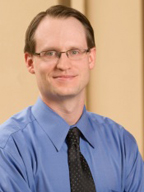 Maximilian Diehn, MD, PhD
Maximilian Diehn, MD, PhD
Assistant Profesor of Radiation Oncology
Dr. Diehn completed his undergraduate training at Harvard College and then pursued medical training, including residency in Radiation Oncology, at Stanford University. His clinical focus is on the treatment of lung cancers and other thoracic tumors. He specializes in stereotactic ablative radiotherapy (SABR) for lung tumors. Dr. Diehn leads an active research group that performs both clinical and translational research, with an emphasis on developing improved methods for cancer detection, treatment, and response monitoring.
 Iris Gibbs, MD
Iris Gibbs, MD
Associate Professor of Radiation Oncology
Dr. Gibbs is a board-certified radiation oncologist who specializes in the treatment of CNS tumors. Her research focuses on developing new radiation techniques to manage brain and spinal tumors in adults and children. Dr. Gibbs has gained worldwide acclaim for her expertise in Cyberknife robotic radiosurgery.
 Steven Hancock, MD
Steven Hancock, MD
Professor of Radiation Oncology
 Kathleen Horst, MD
Kathleen Horst, MD
Assistant Professor of Radiation Oncology (Radiation Therapy)
Dr. Horst specializes in the treatment of breast cancer. She is interested in radiosurgery for breast cancer metastasized to the brain or spine. In addition, she is interested in developing techniques for localized breast radiotherapy to minimize toxicity.
 Albert Koong, MD, PhD
Albert Koong, MD, PhD
Professor of Radiation Oncology (Radiation Therapy)
Dr. Albert Koong graduated from Stanford University with a degree in Biology before earning his Ph.D. in Cancer Biology at Stanford University and his M.D. at Northwestern University. Dr. Koong completed his residency in Radiation Oncology at Stanford University in 2001. He was appointed to the faculty in 2001 and in 2011, Dr. Koong became the Associate Chair and Director of Clinical Operations in Radiation Oncology. His primary clinical research interests are in the area of gastrointestinal malignancies. Dr. Koong currently holds the Sue and Bob McCollum Professorship in the Stanford School of Medicine.
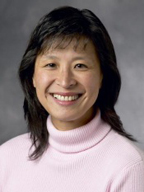 Quynh-Thu Le, MD
Quynh-Thu Le, MD
Chair, Radiation Oncology
Quynh-Thu Le, MD received both her medical school and radiation oncology training at the University of California, San Francisco (UCSF). She then joined the Stanford faculty in 1997. She became the Chair of the Stanford Radiation Oncology Department in September 2011. She also holds the Katharine Dexter McCormick & Stanley Memorial Professorship at Stanford University.
 Billy W. Loo, Jr, MD, PhD, DABR
Billy W. Loo, Jr, MD, PhD, DABR
Associate Professor of Radiation Oncology (Radiation Therapy)
Dr. Loo is a physician-scientist Radiation Oncologist and Bioengineer who received his MD from University of California, Davis and his PhD in Bioengineering from University of California, San Francisco and Berkeley. He completed his Radiation Oncology residency training at Stanford University where he now leads the Thoracic Radiation Oncology program. His clinical specialties are state-of-the-art radiation therapy for lung/thoracic cancers, including stereotactic ablative radiotherapy (SABR) for lung tumors and radiosurgery for brain metastases. His research is in clinical trials and implementation of new treatment techniques for lung cancer, development of new medical imaging methods for measuring organ function and predicting response to cancer treatment, and development of next generation radiation treatment technologies.
 Patrick Swift, MD
Patrick Swift, MDClinical Professor of Radiation Oncology
Dr. Swift received his medical degree from the Perelman School of Medicine at the University of Pennsylvania and completed his residency in Radiation Oncology at the University of California, San Francisco (UCSF). He joined Stanford as a Clinical Professor in 2014, and will serve as the Director of Radiation Oncology at the new Stanford South Bay Cancer Center. Prior to this he served as the Medical Director of Radiation Oncology at Alta Bates Summit Comprehensive Cancer Center since 1997. Dr. Swift specializes in treating brain tumors, prostate and lung cancers.
Head and Neck Surgery
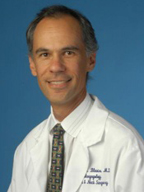 Nikolas Blevins, MD
Nikolas Blevins, MD
Larry and Sharon Malcolmson Professor in the School of Medicine
Dr. Blevins received his bachelor's degree from Stanford University in Biology before completing his medical training at Harvard. He finished his residency in Otolaryngology at the University of California at San Francisco, where he remained for additional fellowship training in otology/ neurotology and skull base disorders.
Dr. Blevins then became the director of the Division of Otology and Neurotology at Tufts University in Boston. In 2003, he returned to Stanford, where he is now the Larry and Sharon Malcolmson Professor of Otolaryngology, and is the Chief of the Division of Otology/Neurotology.
He specializes in disorders of the ear, facial nerve, and skull base, including the comprehensive multimodality treatment of skull base tumors. He is the Director of the Stanford Cochlear Implant Center, which is dedicated to the application of the most advanced technology to hearing preservation and restoration.
Dr. Blevins has an active research interest in innovative minimally invasive surgical methods and the application of computer technology to surgical education and preoperative planning.
 Robert Jackler, MD
Robert Jackler, MD
Edward C. and Amy H. Sewall Professor in Otorhinolaryngology and Professor, by courtesy, of Neurosurgery and Surgery
Dr. Jackler was raised in Waterville, Maine, attended college and medical school in Boston, and moved west to the University of California, San Francisco for residency in Otolaryngology-Head & Neck Surgery. After taking a Neurotology fellowship at the House Ear Clinic (1985), Dr Jackler joined the faculty at UCSF where he remained until 2003 when he become the Sewall Professor and Chair of the Department at OHNS and professor in the departments of Neurosurgery and Surgery at the Stanford University School of Medicine.
Operations Manager
 Maja Lichstein Herberg, MS, MBA Operations Manager, CyberKnife Radiosurgery Program |
The Operations Manager of the CyberKnife program oversees the interdisciplinary CyberKnife staff (neurology and radiation oncology nurse practitioners, coordinators and therapists), providing a seamless patient experience and ensuring our patients get the best and safest care. |
Coordinators
Every CyberKnife patient has a point person among the CyberKnife coordinators. This contact person will take care of scheduling interdisciplinary appointments with the Radiation Oncologist, and Neurologists as well as Radiology imaging and CyberKnife treatment. Coordinators also take care of insurance authorizations and collect medical records from the patient’s referring physician. They can answer any administrative questions.
 Maria Ronquillo CyberKnife Coordinator |
 Luz Tovar CyberKnife Coordinator |
 Tevaite Valenzuela CyberKnife Coordinator |
 Monika VanHuyStee CyberKnife Coordinator Supervisor |
Physicists
 Tony Ho, PhD, DABR Radiation Oncology Clinical Physicist |
 Anthony Lo, MS, MBA, DABMP Radiation Oncology Clinical Physicist |
 Lei Wang, PhD, DABR Chief, CyberKnife Physics |
Nurse Practitioners
As nurse practitioners, we manage acute and chronic conditions through comprehensive history taking, physical exam, ordering diagnostic test and medical treatments, prescribing medications and making referrals. Within the CyberKnife program, we work closely with the radiation oncologists managing patients who require radiation treatment with an emphasis on patient education and symptom management. Laurie Tupper has 10 years of experience working in radiation therapy and with the CyberKnife program. Evelyn Lopez recently joined our team and brings over 20 years of work experience as a nurse.
Radiation Therapists
The CyberKnife Therapists will be a part of your initial simulation and planning procedure, along with delivery of your actual CyberKnife treatment. They are there to assist you both physically and emotionally with your treatment journey. Combined, our CyberKnife Therapists have years of experience in the field of Radiation Oncology.
 Lucia Musunamasi, RTT Radiation Therapist |
 Sandy Kuerth, RTT Radiation Therapist |
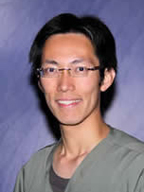 Jackei Lo, RTT Radiation Therapist |
 Stacey Sturken, RTT Radiation Therapist |

